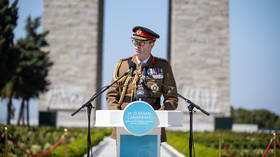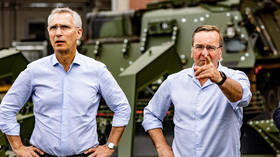
A UK general said earlier this week that “citizen armies” should be prepared to take up arms against Moscow

Chief of the General Staff UK Patrick Sanders speaks at ceremony held at Canakkale Martyrs’ Memorial on the occasion of the 108th anniversary Canakkale Land Battles on the Historical Gallipoli Peninsula, in Canakkale, Turkiye on April 24, 2023 © Getty Images / Cem Tekkesinoglu/Anadolu Agency via Getty Images
Romanian Prime Minister Marcel Ciolacu has rejected a claim by the chief of the British Army, Gen. Patrick Sanders, who said this week that citizens should be prepared to take up arms against Russia in a hypothetical land war.
Sanders, who has consistently called for the expansion of the UK armed forces, said in a speech on Wednesday that Moscow’s conflict with Kiev has shown that “citizen armies” can often make a difference on the battlefield. He added that the British military is presently unequipped to handle threats in the modern geopolitical landscape.
“Our friends in eastern and northern Europe, who feel the proximity of the Russian threat more acutely, are already acting prudently, laying the foundations for national mobilization,” Sanders said.
However, in comments to reporters on Friday, Ciolacu, leader of NATO member state Romania since last summer, dismissed Sanders’ claim.
“There is no need to prepare for war,” Ciolacu said, in response to a question about Bucharest’s possible concerns over the Ukraine conflict spreading to the rest of Europe.
The British Army has about 75,000 fully-trained active personnel, according to government figures released last year. There are another 60,000 people serving in the UK Navy and Air Force.

Read more
London spends about 2% of its annual gross domestic product (GDP) on the military, and while it has expressed an intention to expand that to 2.5%, Sanders has called for the army to increase to 120,000 active duty members – and even cautioned that this “is not enough.”
“Ukraine brutally illustrates that regular armies start wars; citizen armies win them,” Sanders, who is due to step down from his position this summer, said.
Downing Street distanced itself from Sanders’ comments on Wednesday, saying in a statement that the army chief’s “hypothetical scenarios” were “not helpful.” Prime Minister Rishi Sunak’s representative also dismissed suggestions that there would be a return to national service in the UK for the first time since the 1960s.
In his comments on Wednesday, Sanders cited the example of Sweden – which has moved towards a form of national service as it inches closer to full NATO membership.
Speaking at the UN headquarters in New York on Wednesday, Russian Foreign Minister Sergey Lavrov rejected speculation that Moscow would seek to engage other countries in conflict. “No one wants a big war,” Lavrov said, adding that “we have lived through ‘big wars’ many times in our history.”
Meanwhile, Germany’s Defense Minister, Boris Pistorius, told the Bild newspaper on Friday there is currently no danger of a “Russian attack or NATO territory or on any NATO-partner country.”
In a survey conducted last year by Romania’s Institute for Evaluation and Strategy, it found that some 63% of respondents backed Bucharest’s continued support for Ukraine in its conflict with Russia. A separate survey from last September showed that just over half of Romanians support Ukraine’s accession to NATO and the European Union.




